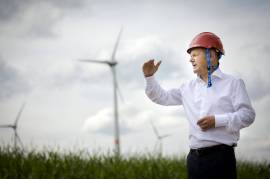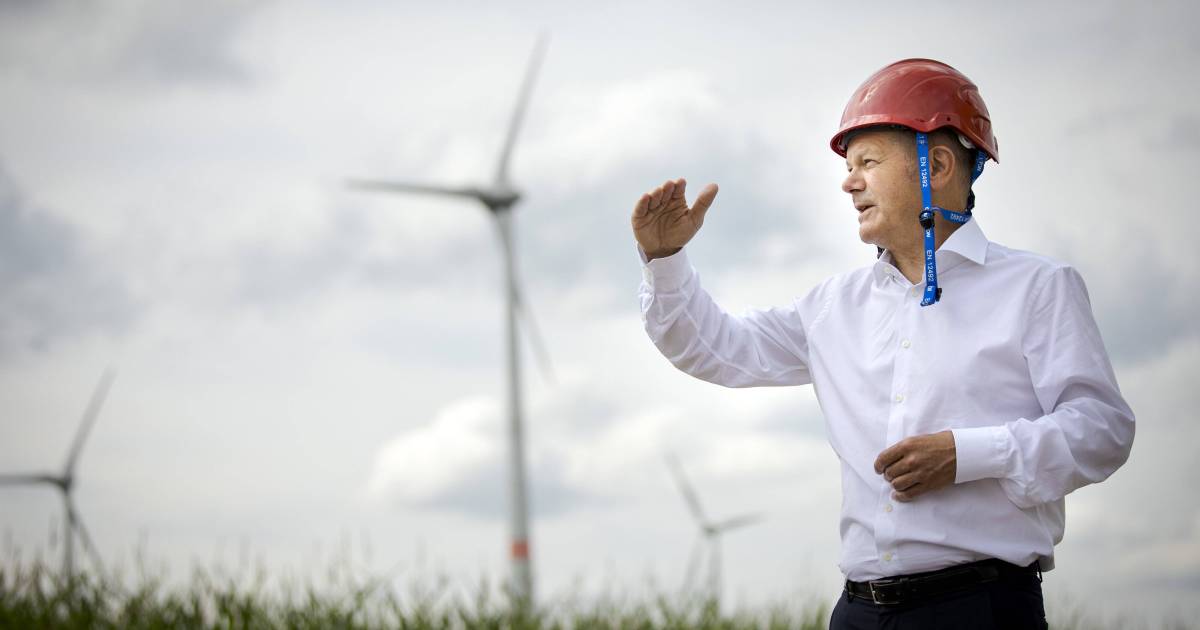
In a strong bid for least surprising prediction of the year, Germany’s Commerzbank said last week that Russian cuts in natural gas supplies could trigger “a severe recession” and possibly even an economic crisis like “the one that occurred after the financial crisis in 2009.” Gas rationing would “probably be inevitable.”
Well . . . yes. Courtesy of Russian President Vladimir Putin, most Germans have just learnt from the evening news what a gas turbine looks like: sort of like a rocket engine, and a lot larger (and heavier) than German Chancellor Olaf Scholz.
Germany’s national turbine drama began months ago when Gazprom, the Russian state-controlled operator of its main gas supply line, Nord Stream 1, sent the Siemens-made piece of machinery to Canada for maintenance. Ottawa refused to send it back, citing Ukraine sanctions; in response, Gazprom suspended all deliveries to Germany. Berlin had to beg the Canadians for the turbine’s return, so as not to give the Kremlin excuses for keeping the gas tap turned off.
When the behemoth landed in Germany, Gazprom first sent the gas supply back up to 40 percent, and then throttled it back down to a fifth of the pipeline’s capacity; gas prices jumped 20 percent. The company says the missing turbine is to blame. But it refuses to take it back without “guarantees,” said Kremlin spokesman Dmitry Peskov, alleging that otherwise the turbine could be placed under sanctions or turned off remotely. German industry and policymakers say the former assertion is untrue and the latter groundless.
Chancellor Scholz gave a snap televised press conference in front of the colossal piece of kit, still awaiting its onward journey in a factory hall. It was, he said, in perfect working order and ready to travel; Gazprom’s (and the Kremlin’s) cynical feints were just a “bluff.”
But Putin, of course, is not bluffing. His message to Berlin is simple: turn on Nord Stream 2, or your economy gets it.
To its credit, the “traffic light” (Social Democrat-Green-liberal) government has been laboring to wean Germany off Russian fossil fuels for months. Coal imports have been stopped. Oil imports are scheduled to end by December. But decoupling from gas, Berlin says, will take until the end of 2024 — chiefly because key German industries (chemicals, paper, glass) depend on it, and because most private households heat with it.
Some companies have been nimble enough to adapt: For example, SKW in Saxony Anhalt, a producer of fertilizer that was being priced out of the market, switched to manufacturing a water-urea mix that is much in demand to reduce diesel engine pollution. Mayors are announcing that they will turn off building lights at night, and stop heating public pools. The government is promising energy allowances to companies hit particularly hard by rising gas prices.
The coalition might even give up its refusal to extend the life of Germany’s last three nuclear plants. (In which case I will have been wrong in my previous column.) By way of bait, the opposition has dangled a speed limit — and this despite the fact that Germans consider tearing up and down the Autobahn at 200km per hour as a sacred and inalienable birthright, comparable only to Americans’ Second Amendment right to bear arms.
Still, lowering consumption, switching products, and government handouts will not stop insolvencies, offshoring, and loss of jobs — or gas rationing. And so Germans are bracing themselves for a possible recession, with continuing inflation, a marked drop in consumer spending power and a darkening business climate.
The latest polls still show strong support for Ukraine, and for decoupling from Russian fossil fuels; but it is diminished, and shows a clear east-west divide. Eastern mayors and state legislators have warned of “massive social tensions.” The minister president of Saxony wants the war in Ukraine to be “frozen,” his Bavarian counterpart calls for “thinking of our own people.” The frictions between the three government coalition partners are beginning to show.
A bizarrely self-congratulatory Russian propaganda video that recently went viral said: “Winter is Coming [Time to Move to Russia].” But conceding to the Kremlin by pushing Ukraine towards an armistice and putting Nord Stream 2 into operation would be political suicide. Putin is waging war not just against Ukraine, but against the West. And Germany is the fulcrum where he must apply maximum force to break up Europe and the trans-Atlantic alliance.
Hard times lie ahead. So be it.


